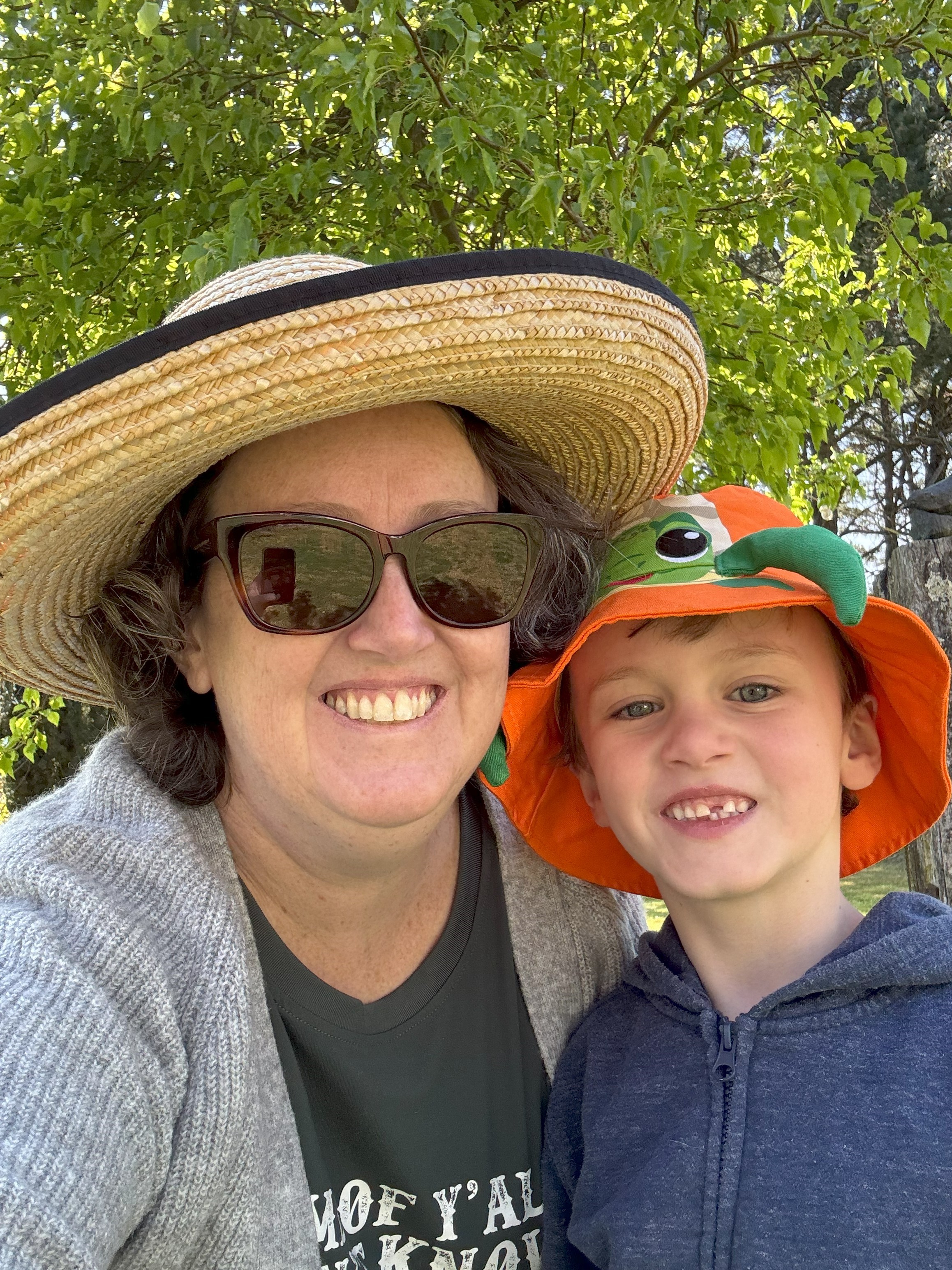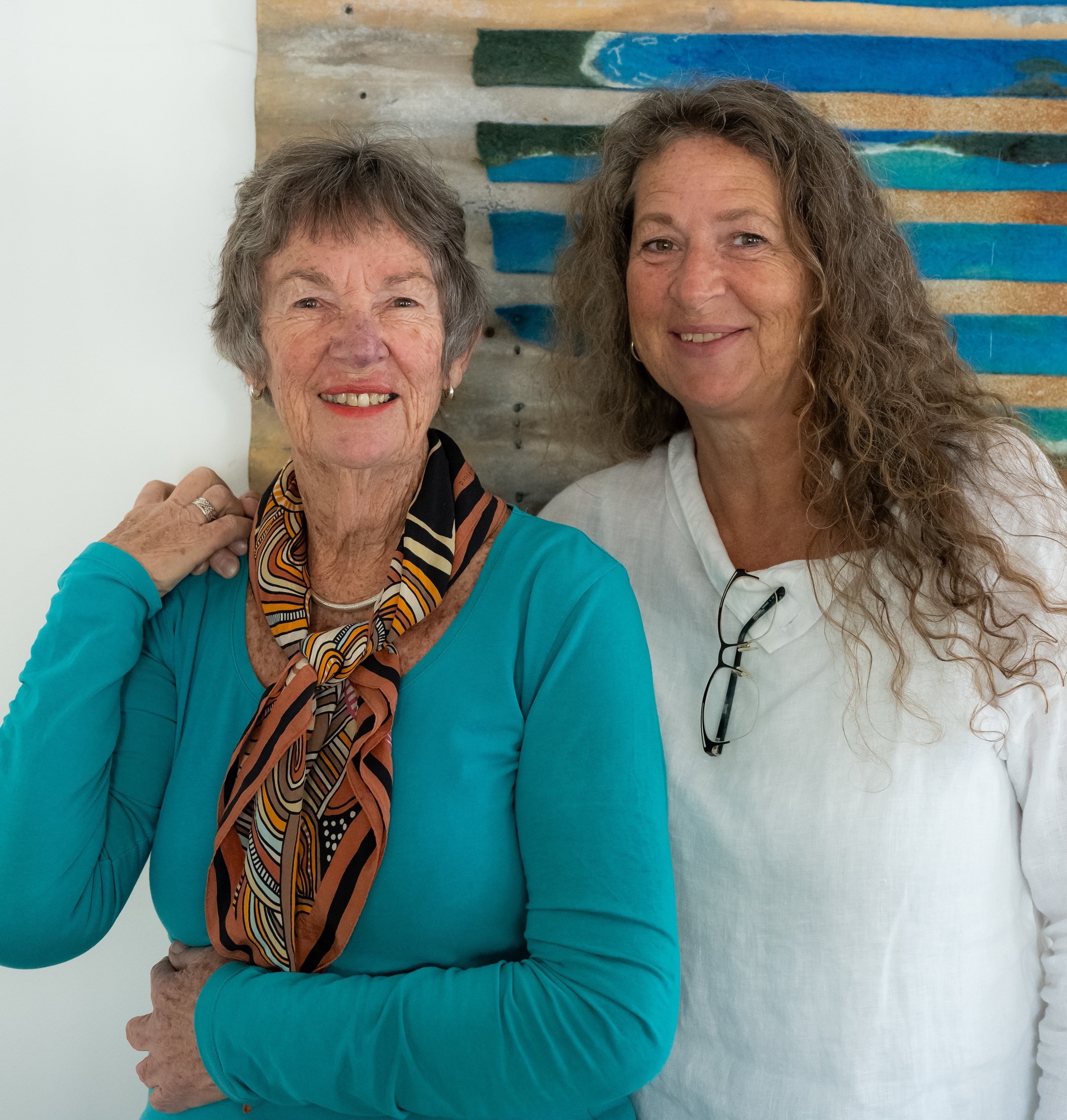Published 30 October 2024
This National Carers Week we spoke to two carers to hear some of their personal experiences and challenges.

My name is Liz and I have been a carer in one way or another for most of my life.
From 2007-2015 I was a full time carer, and since then I have juggled work and caring for my 3 children. My kids all have autism and ADHD, and then various combinations of intellectual disability, childhood apraxia of speech, developmental coordination disorder and oppositional defiance disorder. They are 6, 16 and 18 years of age.
There is no such thing as typical in this house! My six year old wakes around 5am every morning and I am NOT a morning person so my husband often gets up with him. We have support workers for the older two kids who come from 6:30am – 9:30am four days a week to help them get ready for school. We have slowly built to having a team who know the kids but this still often requires a lot of oversight from me to ensure the kids are ready on time and that they have all had their medication. I dress and take my six year old to school on these mornings. On the one day we don’t have a support worker, I take all 3 kids to school, and they all attend different schools so this is a bit of a drive!
Once they are at school, I return home and start work. I am super lucky to be able to work from home in a role that is flexible. I work from 9:30am-5:30pm four days a week. A typical work day also requires me to be able to answer calls from the kids' therapists, liaise with their support coordinator, field emails, and try and navigate NDIS changes and reviews. When you times these things by 3 it gets pretty busy some days. Currently we are also planning for next year when our 18 year old finishes school and wants to move out. Our 16 year old is also trying to get an apprenticeship and leave school at the end of this year so there is a lot of change to negotiate!
After school, the big kids again have support workers – this time one each – and they do a variety of activities. This allows my husband time to take the six year old to his extra curriculars, which all help reinforce his skills learnt in therapy. When I finish work, I try and fill my husband in on everything that has happened that day while we sort dinner and bedtime routines.
My husband and I have ‘date night’ once a week which consists of take out at home and watching TV as it’s too hard to find a babysitter to look after all 3 kids.
Ironically, the main time I’ve felt discriminated against was when I saw a therapist to discuss my feelings of being a carer. This therapist was not understanding at all about needing to be flexible due to caring demands. Since then I have found a new therapist who is great, so please don’t let that put you off talking to someone.
As I said earlier, I’m really lucky that my work is understanding and flexible. I manage a team of staff now and have passed on that understanding to my team.
Carers Week and Carers NSW are so important because they shine a light on the often invisible work that carers do. They provide a platform to recognise and celebrate the contributions of carers, while also advocating for more support and resources. For me personally, these initiatives help me feel part of a larger community and remind me that I’m not alone. They also push for better policies and services to support carers, which can make a real difference in our day-to-day lives. Knowing that there is an organisation which cares about me and the struggles that I face gives me the courage to stand up for my rights, and the rights of others.
I haven’t had to use the Carers + Employment Hub to assist with my work, however I have looked through it and loved the information provided for employers to encourage and support them to engage carers. I even brought up the Aged Care Workforce Project with my organisation's recruitment team and was very excited to find out that we are already working with Carers NSW to support carers who want to enter the care industry.
Having all of the employment information in one place is amazing. I wish it had been available when I first started work. I will definitely be using it in the future if I need information to advocate for myself, or for the carers I support through work.
I am a single 62-year-old mother of three, grandmother of four.
For 3 ½ years, I have been a live-in carer for my now 80-year-old, physically independent mother who was diagnosed with Alzheimer's in 2019. I am eternally grateful that the progression of Alzheimer's has been exceptionally slow and for the support of my sisters.
The challenges for me come from understanding the myriad of fluid presentations of Alzheimer’s and appropriately managing the accompanying medical conditions, of which symptoms are often unclear and transient, and treatment for one is contraindicated with the treatment for another. This is further complicated by long term anxiety and depression.

In late 2022, another family member who has no partner nor children to support them, became exceptionally physically and psychologically unwell. After a gruelling 2 years, diagnosis is still unclear, but pointing towards Parkinsonism, with anxiety and depression.
Being self-employed meant I had the flexibility to take on a carer’s role for both. I am an internationally certified coach and mentor, and have been working in the personal development and wellness industry for 16 years. I also have experience in aged care and as a Lifeline Crisis Supporter. I have a plethora of tools, resources, resilience, and support to call upon. What I found most time consuming, frustrating and exhausting was the endless observation, research and documentation of care-receiver’s symptoms and behaviours, which I then had to relay to the healthcare professionals, hoping that one might offer a suitable treatment plan. This is often met with “let’s try this” and waiting a long time between appointments, whilst observing, monitoring, and hoping I didn’t have to explain the whole situation again to a new practitioner for the next appointment. Being met with numerous dead ends, misinformation, “sorry, I can’t help you” and “I don’t know who might be able to” is a draining, tedious and relentless process.
The worst part is the emotional anguish. Even with using every resource I could muster, coping with having no solid answers and treatments, whilst witnessing the mental and physical decline of loved ones, is heart wrenching. When they feel exhausted from living with or fighting their symptoms, stuck in uncertainty encouraging them to have hope, is a daily occurrence.
For me, the load crept up and gradually took priority over my life. I lost sight of my future and had no energy to execute a plan anyway. This resulted in emotional burnout and needing to temporarily close my business to focus on my mental health. I’m grateful for the tools in my kit that have supported my own recovery out of burnout. I am now in transition of stepping out of the full-time live-in carer role and consciously planning a new future.
There is a variety of typical days. Mum is still independent in a lot of ways, and I see it is a part of my role to help her maintain that independence as best she can. So, therefore I have been flexible around her.
Each day includes checking mum’s energy and emotional state, and food and water intake to minimise the likelihood of anxiety and depression popping in, checking that medications have been taken and updating the “What’s On” boards.
A day can include any of these: coordinating and accompanying her to medical appointments and other activities; Managing the Home Care Services; shopping and cooking; going for a walk, swim or cuppa with mum. calming mum after she wakes from a catastrophic nightmare that, from the terror in her eyes, she is convinced is real; repeating answers to the same questions time and time again; or searching for some lost object that eventually pops out of nowhere.
I practice as much self-care as I can: walk, swim or surf at the beach, meditate, journal, do some art, and catch up with friends, family and peers who are a part of my support team. Building my coaching business used to be included, but for now this is on hold until my health is back in order.
I understand the importance of routine. However, I've been stuck between putting routine in, which then impacts mum’s independence, and me working around her, which has impacted my health, autonomy and lifestyle. Finding more balance is my next opportunity.
I wouldn't say I've ever felt discriminated, but I've definitely felt invisible and dismissed. As both family members’ conditions are neurological, complicated with physical and medical conditions, they are often unable to adequately articulate their situation or comprehend and remember what they need to at medical or other appointments, such as Centrelink. I accompany them with my notes and observations.
I understand that the doctor or service provider needs to converse with the patient/client. However, when the doctor needs detailed facts, and the patient indicates they don’t know, or their recollection of the facts is often inaccurate or totally fabricated and they turn to me to fill in the gaps, the doctor needs to listen to me.
There have been many times that I have felt my information has fallen on deaf ears, and I have needed to assert myself to be heard.
Having a personal interest in mindset, neurology and human behaviour, I know I have a deeper knowledge than the average person. Having worked as a nurse, I understand how to take suitable notes on a “patient”. Often I felt dismissed and treated as if I was an overreactive, interfering family member, when really I was a caring, concerned caregiver with a holistic view to recovery.
The more I talk with others, the more people I meet who are caregivers or starting the conversation around ageing parents’ needs. Caring for someone else is not just a thing on the side of everything you already do. It may start off like that but can escalate very quickly to take priority over your life.
The commitment is big. The impact on the carer’s life can be significant.
Carers Week is important to bring attention to how big the need is for carers in the community, to recognise those working in the community, to educate and share resources and support options for both caregiver and receiver. Carers NSW is a great resource and hub of information, which seems to be invested in really understanding and supporting this growing community workforce, at all stages of the caring cycle.
Everyone will be touched by old age or illness, as a carer or your own experience being cared for. Learn about it before one creeps up on you.
Last updated: